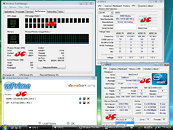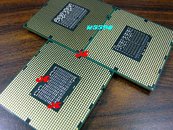Friday, July 31st 2009

Core i9 ''Gulftown'' Comes to Life
Intel's posterboy processor for the 32 nm Westmere architecture, the six-core Gulftown is now living, breathing silicon. The company seems to have already dispatched samples of the chip. Gulftown is based on the LGA-1366 socket. Featuring 6 cores and 12 threads with HyperThreading enabled, it holds 12 MB of L3 cache to support the additional data load over the QuickPath Interconnect.
A noted enthusiast has two Gulftown processors running in a dual-socket setup. This 12 core, 24 thread monstrosity uses 24 GB of DDR3 memory using 4 GB modules (perhaps 2 x 3 modules). The processors are running at 2.40 GHz (18 x 133 MHz). The machine was put through WPrime multi-threaded benchmark. It crunched WPrime 32M in a little over 6 seconds, and 1024M in 145.6 seconds. Going by older information, Gulftown should be implemented in a commercial product in Q1 2010, when Intel plans a host of other important product launches. When released as Core i9, the processor will target the premium enthusiast market.
Source:
XtremeSystems Forums
A noted enthusiast has two Gulftown processors running in a dual-socket setup. This 12 core, 24 thread monstrosity uses 24 GB of DDR3 memory using 4 GB modules (perhaps 2 x 3 modules). The processors are running at 2.40 GHz (18 x 133 MHz). The machine was put through WPrime multi-threaded benchmark. It crunched WPrime 32M in a little over 6 seconds, and 1024M in 145.6 seconds. Going by older information, Gulftown should be implemented in a commercial product in Q1 2010, when Intel plans a host of other important product launches. When released as Core i9, the processor will target the premium enthusiast market.


93 Comments on Core i9 ''Gulftown'' Comes to Life
like i said before dont hate on the people that buy this, and encourage them to push it to the limit thats what the extremes are for.
if i start working again i will deff buy this cpu since its a drop in upgrade :rockout:
If I wanted to, I could have a much larger house, a very nice car etc. I have the money for that. I'm in a 1100 sq ft apartment (we're 4 in it) and we have a Honda Civic 2002 with 150 000 miles on it.
I hate wasting $$ when it could go somewhere useful.
That's why I hope AMD will somehow develop some CPU that will rival the high-end i7s... that would push Intel to drop the prices even more.
some will buy a really expensive system and not upgrade for years and when they need more speed they will overclock there cpu or get the next big thing ( again a few years later )
The comparison you're making isn't quite correct. I could go buy an E5200 to game with for ~$70 and it will game nearly as well as an i7 (acceptable framerates). So are you saying because I can get this E5200 for 1/10th the cost of the i9 that I should indeed ignore the faster and better processor just so I can save money that won't matter to me?
The people that this will be targeting most likely will be a one time splurge like Wile E will be doing or it won't matter to them basically being pocket change. As mentioned earlier like the guys riding around in the Ferrari's, you won't buy a Ferrari (normal person) if it's going to cause an issue somewhere else.
I'm with others here, buy the best you can. At the end of the day you'll still have tech that will last a lot longer than you'll keep it, at which point reselling it you'll make some of your money back and upgrade to the next new thing out.
On another note, I wouldn't buy this processor at full retail or even half retail because I am an individual that can afford to purchase a processor that costs a grand.
Lets leave it on:
"if you got the money and want it, go for it"
back on topic
------------------
n-ster / odameyer
you both have your opinions and i have mine but we can still be friends in the end
My opinion though is get good quality at the right prices, but don't go extreme for a whole amount more. Gaming is not the only thing PCs do you know :p I have the money, sure I'd like to have a six-core CPU.... But I hate wasting money if what I do (gaming yes, but other stuff too) will not benefit at all or VERY little from it or even a moderate amount, if it means spending 1k$. Perhaps you don't see it, but North America is a very wasteful way of life in general. I try to stay away from that, my dad is the same way which is why is companies do very well. If you don't know what to do with your money, give it to the poor or use it to make more money so that later you can give it to the poor.
anyways Assassin's probably right, we should get back on topic and we have different views... so what? :p
i guess media will be the first to take the advantages of 12 thread
and for gaming it will take a long time, i think only the only thing that scaling in gaming is the video card tech thingy, and also it's price :mad:
hmmmmmm come to think of it those programs are the multi threaded programs that benifit form multi threaded cpu's, why the general public see and have no real pratical use for multi threaded cpu's is the software hasnt cought up, and wont for another few years, heck general software is still stuck on 32bit (dont get me started on that one)
yes ppl will still buy quads, hexa, octo, ect core cpus because they want the best, or just the biggest e-penis, or may have a genuine reason (the rarest reason of all), and that is fine, but for the general public a dual core is quite often more then enough, a 4>4.5 ghz dual will keep up (95% of the time) with any gaming rig the only down fall is only GFX power, and dx 11 should help that in months to come (but then again the software is the limiting factor has to keep up)
It's easy to get people thinking that more cores = more performance. That's the first thing I thought when my uncle showed me his Pentium D 3GHz, thet it was as good as a P4 at 6GHz. However, more threads/cores easily benefits special interest like supercomputers. Theoretically, a supercomputer with 1 million dual cores is just as good as a supercomputer with 2 million single cores. Servers too, although it's not as extreme as an example.
BTW ... multi-core processors are faster than the same configuration with multiple single core prossors. (quad > 4 x singles).
Ugh.. I don't even want to start the cores and software argument... I've been through it too many times. But I will still say that most programs aren't optomized for multi-core yet :nutkick:
(my i7 975 soon to be on sale ) =P
Why upgrade until there is an 8 core that runs at 3.6ghz? Besides, software (outside of video encoding) needs to catch up :o
ooh that's made ya think ey:D
has he that kind of money
If you are talking about general applications, there are many that utilize multi-core processors to their full advantage.
Remember, not every application needs to be a multi-threaded, multi-core powerhouse. I doesn't make any sense for a developer to pour effort into creating that kind of code, especially as the OS's get better at thread execution distribution between cores.